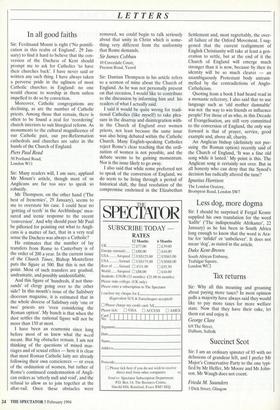Sir: Many readers will, I am sure, applaud Mr Mount's
article, though most of us Anglicans are far too nice to speak so robustly.
Mr Thompson, on the other hand (`The best of frenemies', 29 January), seems to me to overstate his case. I could hear no `gritting of teeth' in the Archbishops' mea- sured and irenic response to the recent `conversion'. And why should poor Mr Paul be pilloried for pointing out what to Angli- cans is a matter of fact, that in a very real sense the Duchess was always a Catholic?
He estimates that the number of lay transfers from Rome to Canterbury is of the order of 200 a year. In the current issue of the Church Times, Bishop Montefiore puts the figure at 500. But this is not the point. Most of such transfers are gradual, undramatic, and possibly unidentifiable.
And this figure of 'hundreds, if not thou- sands' of clergy going over to the other side? In this month's issue of the Salisbury diocesan magazine, it is estimated that in the whole diocese of Salisbury only 'one or two' priests are 'even considering the Roman option'. My hunch is that when the dust settles the national figure will not be more than 150 at most.
I have been an ecumenist since long before most of us knew what the word meant. But big obstacles remain. I am not thinking of the questions of mixed mar- riages and of sexual ethics — here it is clear that most Roman Catholic laity are already following their own consciences — or even of the ordination of women, but rather of Rome's continued condemnation of Angli- can orders as 'utterly null and void', and the refusal to allow us to join together at the altar-rail. Once these obstacles were removed, we could begin to talk seriously about that unity in Christ which is some- thing very different from the uniformity that Rome demands.
Sir James Cobban
10 Coverdale Court, Preston Road, Yeovil


















































 Previous page
Previous page